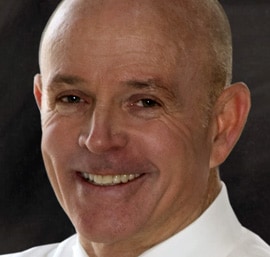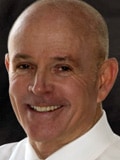
Greg Sowards (Courtesy photo)
Republican U.S. Senate candidate Greg Sowards is a hard worker and a man of faith who has never been afraid to take on the establishment or forge his own path.
This is the last of four profiles of the U.S. Senate candidates that seek to tell the stories of who they are and what shaped them.
Greg Sowards has gotten much of what he wanted from life, and he attributes that primarily to hard work.
He has a big family that has always been frugal, which gave him the money he needed to tinker with ideas, apply for patents and invest in business opportunities. He’s held side jobs when necessary. Once he worked as a runner for UPS during the Christmas season.
His success helped shape the vision he’s long held for changing America. It’s a vision that, in many ways, looks like views held by today’s Tea Party, but he’s been pushing it for a long time.
Sowards decided to challenge then-U.S. Rep. Joe Skeen in the 1996 Republican primary largely because he was concerned about the growing national debt. It was then that Sowards developed a list of questions he’s been promising to use as a test for whether he will vote on legislation:
Is it worth putting our children and grandchildren into debt? What effect does it have on America’s traditional family? Does it take rights away from law-abiding citizens and give them to criminals? Does it strengthen and uphold the U.S. Constitution? Does it protect the sovereignty of America?
Sowards didn’t defeat Skeen, but he now says not even he expected that to happen. He did win 30 percent of the vote. He ran again for the seat in 2008, getting into a five-way primary in which two opponents had lots of help from national political action committees. Sowards finished fourth that year. He likes to point out that he came within two percentage points of finishing second.
Now he’s back on the ballot as a Republican U.S. Senate candidate. And though the odds are overwhelmingly in Heather Wilson’s favor in the GOP primary, Sowards remains focused and determined.
That’s who he is. Sowards is a true believer in the cause. He’s a hard worker and a man of faith. He’s never been afraid to take on the establishment or forge his own path.
‘I always worked’
Until he was 14, Sowards lived in the Northeast Heights of Albuquerque, which at the time was the edge of the city. Then his family moved to a small farm and ranch they owned in Los Lunas, where they raised cattle.
“I always worked,” Sowards said. “My dad taught me to work.”
After high-school graduation, Sowards went to New Mexico Military Institute, which he said was a difficult transition “because I was not used to being told what to do.”
He started boxing, gained some respect from his classmates and people in Roswell, and, he said, kept a smile on his face.
Then, for a time, he worked as a machinist in Albuquerque. His father was also a machinist.
In 1969, Sowards received his military draft notice. He intended to get a student deferment and was told it would take two months to kick in. So in September 1969 and in a bit of limbo, he set out on his motorcycle on a trip across the Northwestern United States and Canada. On the way back he stopped in Colorado to stay with a friend who was attending college and worked for a time loading squash onto trucks.
The student deferment was not meant to be. After Sowards returned to Albuquerque, the December 1969 draft lottery made clear he was joining the military. Rather than waiting to be called up, he enlisted.
Sowards was on active duty for three years. He spent a few months in Alabama working with the National Bureau of Standards. Then, during the Vietnam War, he was sent to Korea. He didn’t see combat.
But his military service and the Vietnam War helped shape his views on the problems with the U.S. government. Sowards, who was unmarried at the time, says he told friends shortly after returning from Korea that, “If we were serious about winning the war in Vietnam, I would reenlist so that some married man back in the states would not have to – but we are not serious.”
Settling down
Sowards returned to Albuquerque, enrolled at the University of New Mexico and met Karen, who would become his wife. It was at that time that Sowards, who grew up involved in the Church of Jesus Christ of Latter Day Saints, decided to make a more active commitment to the church.
Karen had recently joined the church, and Sowards said he “fought my way back.” That battle he said, including changing friends, but he didn’t go into a lot of detail about that period in his life.
He did say the group of friends he hung out with during his earlier years in college used to speculate about whether he would someday run for Congress, but he eventually “broke away from that group.”
“It was a time of change. People were looking for something… and they didn’t know where to find it,” Sowards said when asked about that group. “I just decided I wanted to settle down, get married.”
Which he and Karen did. He later transferred to Brigham Young University in Provo, Utah, to finish his teaching degree.
On graduation day, Sowards was in a cap and gown with two sons in his arms. Today he and Karen have six adult children and 20 grandchildren.
‘Not everybody has the fortitude’
“A lot of people have ideas, but not everybody has the fortitude to stick with it.” – Greg Sowards
From there Sowards moved to Amarillo, Texas, where he taught at a school for troubled boys. Then he moved to Missouri, where he started a business and taught school. In 1987, he and his family moved to Las Cruces, where Karen had lived as a teenager.
Sowards taught school for one year in Las Cruces before he and his wife started their child-care business that, today, has six centers in the Las Cruces area, employs 75 people and cares for more than 600 children.
Along the way, Sowards was awarded five U.S. patents. He invented Kwik Kik, a soccer-training device.
Sowards is proud of his patents and says they are indicative of his work ethic and determination.
“A lot of people have ideas, but not everybody has the fortitude to stick with it,” he said.
A vision for America
Today, Sowards says his faith is an integral part of his life.
“It’s been great for me. I say whatever works for somebody in their life, then that’s wonderful. But it has worked for me,” he said. “My children are all active, and my grandchildren, I know where they’ll be Sundays. And that’s nice. I think that’s something that, in today’s world, is reassuring.”
Sowards’ vision for America stems largely from his work ethic and his faith. He envisions a very limited federal government and much of the work that needs to be done taking place on a local level – through local and state governments, churches and other organizations, and through the dedication and sacrifice of people who have worked hard and have something to give back.
Such a societal structure, he believes, would create a shared sense of purpose in communities and force them to solve their own problems. He said that, not federal subsidies and entitlements, will help eliminate poverty and other ills.
“In working hard, you realize there are fruits to working hard. Those fruits are yours, or should be,” he said. “Then there’s room for compassion, but that’s up to you. Your relationship with God is what shapes your compassion, your desire to be compassionate with your goods and services.”
That’s the opposite of how Washington approaches things, Sowards said.
“They feel compassionate when they hang on to their money but distribute other people’s money. They call that compassion,” he said. “I don’t see that as compassion. I see that as extortion, and it’s all for their glory.”
Sowards promised that he won’t be bought by that system if elected.
“I will not come back to New Mexico and explain to those I love most, and that is my family, how I was won over by Washington, how I sold out,” he said. “That I will not do.”
‘We’re all looking for leadership’
Why has Sowards continued to challenge the status quo in the GOP and America by running for office? He’s passionate about what he believes are true, conservative principles society should follow. He considers them critical to the future of America.
“I love America. I love the freedoms that we have,” he said. “We’re the envy of the Earth and I think we’re in a position that we could lose it if we don’t change the kind of people that we send to Washington.”
Sowards said his children and wife has also pushed him to continue running. Like him, they’re hard workers and true believers. Sowards has invested a great deal of his own money over the years in his races. He believes he can help change America.
“We’re primed as a nation, we’re all looking for leadership, and I believe I’ll provide that,” he said. “I guess that’s what compels me.”
A prior version of this article incorrectly quoted Sowards as saying “My children are all active, and my grandchildren, I know where they’ll be someday” rather than “I know where they’ll be Sundays.”
